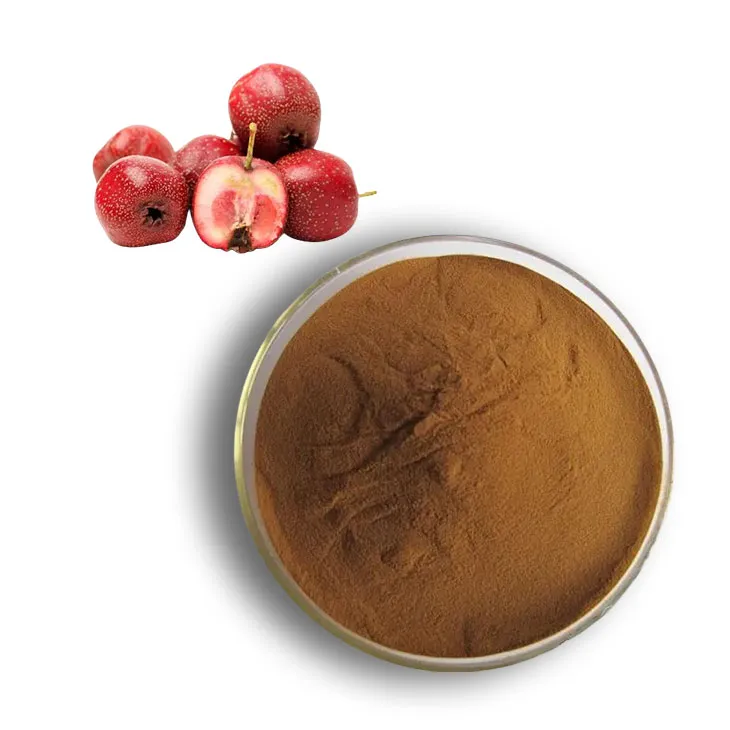- 0086-571-85302990
- sales@greenskybio.com
Shaping the Future: Trends and Innovations in the Hawthorn Extract Industry.
2024-12-21

1. Introduction
The Hawthorn Extract industry has been gradually emerging as an important part of the natural health product sector. Hawthorn, with its rich history in traditional medicine, especially in Asian cultures, has now caught the attention of the global market. As the industry moves forward, it is being significantly influenced by a variety of trends and innovations. These factors not only shape the way products are developed and marketed but also determine how the industry responds to regulatory requirements and consumer demands.

2. Research - Driven Product Development
2.1 Understanding the Bioactive Compounds
Recent research has focused on identifying and characterizing the bioactive compounds present in hawthorn. Compounds such as flavonoids, procyanidins, and triterpenic acids have been found to possess various health - promoting properties. For example, flavonoids are known for their antioxidant effects, which can help in reducing oxidative stress in the body. Procyanidins may contribute to cardiovascular health by improving blood vessel function. With a better understanding of these compounds, companies in the Hawthorn Extract industry can develop more targeted and effective products.
2.2 Clinical Trials and Efficacy Studies
To further validate the health benefits of Hawthorn Extract, an increasing number of clinical trials are being conducted. These trials are crucial for providing scientific evidence of the efficacy of hawthorn extract in treating or preventing various health conditions. For instance, some studies have investigated the role of hawthorn extract in managing hypertension and heart failure. The results of these trials can be used to inform product labels and marketing claims, which in turn can enhance consumer confidence in hawthorn - based products.
2.3 Product Diversification
Thanks to research advancements, the range of hawthorn - extract - based products has expanded. In addition to traditional dietary supplements in the form of capsules or tablets, hawthorn extract is now being incorporated into functional foods and beverages. For example, hawthorn - flavored teas and energy bars containing hawthorn extract are becoming more popular. This diversification not only provides consumers with more choices but also helps the industry to reach a wider market segment.

3. Regulatory Impacts
3.1 Quality Control and Standardization
Regulatory authorities around the world are increasingly focused on ensuring the quality and safety of hawthorn extract products. This has led to the development of strict quality control measures and standardization protocols. For example, in the European Union, hawthorn extract products must comply with specific regulations regarding the purity of the extract, the identification of active ingredients, and the absence of contaminants. Manufacturers are required to implement good manufacturing practices (GMP) to ensure consistent product quality.
3.2 Labeling Requirements
Accurate and transparent labeling is another important aspect of regulatory compliance. Labels must clearly state the ingredients, the source of the hawthorn extract, the recommended dosage, and any potential side effects or contraindications. In some countries, such as the United States, the Food and Drug Administration (FDA) has specific guidelines for dietary supplement labeling. Failure to comply with these requirements can result in legal consequences for manufacturers.
3.3 Regulatory Approvals for New Applications
As the industry explores new applications of hawthorn extract, such as in the treatment of specific diseases, regulatory approvals become crucial. Obtaining regulatory approval for new therapeutic uses often requires extensive pre - clinical and clinical research data. For example, if a company wants to market hawthorn extract as a treatment for a particular type of heart disease, it must conduct rigorous studies to prove its safety and efficacy. This process can be time - consuming and expensive, but it is essential for the long - term growth of the industry.

4. Consumer Trends
4.1 Increasing Interest in Natural Health Products
In recent years, there has been a significant upward trend in consumer interest in natural health products. Consumers are increasingly looking for alternatives to synthetic drugs and are more willing to try products derived from natural sources like hawthorn. This trend is driven by factors such as a growing awareness of the potential side effects of pharmaceuticals and a preference for holistic approaches to health. Hawthorn extract, with its long history of traditional use and emerging scientific evidence of its benefits, is well - positioned to meet this consumer demand.
4.2 Demand for Functional Foods and Beverages
The demand for functional foods and beverages is on the rise, and hawthorn extract is finding its way into this market segment. Consumers are attracted to products that not only taste good but also offer health benefits. For example, a hawthorn - infused energy drink can appeal to consumers who are looking for a natural way to boost their energy levels while also maintaining good cardiovascular health. This trend is prompting companies to develop more innovative food and beverage products containing hawthorn extract.
4.3 Online Shopping and Consumer Information
The growth of online shopping has had a significant impact on the hawthorn extract industry. Consumers can now easily access a wide range of hawthorn - based products from around the world through e - commerce platforms. However, this also means that consumers are more exposed to a large amount of information, both accurate and inaccurate. As a result, companies need to ensure that they provide reliable and evidence - based information about their products on their websites and other online platforms. Additionally, they need to manage their online reputation to build consumer trust.
5. Opportunities and Challenges
5.1 Opportunities
- The expanding research base provides an opportunity for the industry to develop more sophisticated and effective products. For example, new product formulations can be created based on the latest findings regarding the bioactive compounds in hawthorn.
- The increasing consumer interest in natural health products and functional foods offers a large and growing market for hawthorn extract. Companies can target different consumer segments with customized products.
- Globalization and the growth of e - commerce enable companies to reach a wider international market. Hawthorn extract products can be exported to different countries, provided they meet the respective regulatory requirements.
5.2 Challenges
- Meeting regulatory requirements can be a complex and costly process. Smaller companies may struggle to afford the necessary testing and compliance measures.
- Competition in the natural health product market is intense. With many other herbal extracts and supplements vying for consumer attention, hawthorn extract companies need to differentiate their products through effective marketing and product innovation.
- Ensuring the consistency and quality of raw materials can be a challenge. The quality of hawthorn can vary depending on factors such as the growing region, harvesting time, and processing methods. Companies need to establish reliable supply chains to maintain product quality.
6. Conclusion
The hawthorn extract industry is at a crucial juncture, shaped by trends in research - driven product development, regulatory impacts, and consumer trends. These elements present both opportunities and challenges for the industry. To thrive in the future, companies in the hawthorn extract industry need to stay abreast of the latest research, comply with regulatory requirements, and respond to consumer demands. By doing so, they can contribute to the continued growth and development of this promising industry.
FAQ:
What are the key research - driven product developments in the hawthorn extract industry?
Research in the hawthorn extract industry has led to several key product developments. For example, there has been a focus on isolating specific bioactive compounds in hawthorn for more targeted health benefits. Scientists are constantly exploring ways to enhance the extraction methods to preserve the potency of these compounds. Additionally, research has been directed towards formulating hawthorn extract in different dosage forms such as capsules, tablets, and tinctures for ease of consumption and better absorption. There are also studies on combining hawthorn extract with other complementary natural ingredients to create more comprehensive health products.
How do regulatory impacts influence the hawthorn extract industry?
Regulatory impacts play a significant role in the hawthorn extract industry. Stringent regulations regarding the safety, quality, and labeling of products ensure consumer protection. In some regions, regulations may require specific manufacturing standards for hawthorn extract products. This can include Good Manufacturing Practice (GMP) compliance, which affects production processes, quality control, and documentation. Regulatory requirements also influence the claims that can be made about the health benefits of hawthorn extract. Manufacturers need to provide scientific evidence to support any health - related statements on their product labels, which can either limit or encourage innovation depending on how well - founded the research on hawthorn extract is.
What are the current consumer trends in the hawthorn extract market?
Currently, consumers are increasingly interested in natural and plant - based products, which is a positive trend for the hawthorn extract industry. There is a growing demand for products that are free from artificial additives and preservatives. Consumers are also more aware of the potential health benefits of hawthorn, such as its role in heart health and digestion. This has led to an increase in the popularity of hawthorn extract as a dietary supplement. Another trend is the preference for sustainable and ethically sourced products. Consumers are more likely to choose hawthorn extract products that are sourced from environmentally friendly and fairly traded sources.
What new opportunities are emerging in the hawthorn extract industry?
New opportunities in the hawthorn extract industry are arising from various factors. The increasing consumer interest in natural health products creates a larger market for hawthorn extract. As research uncovers more health benefits, there is potential for product expansion into new areas such as functional foods and beverages. For example, hawthorn extract could be added to energy drinks or healthy snacks. The trend towards personalized nutrition also offers an opportunity, as hawthorn extract can be formulated to target specific health needs of different consumer groups. Additionally, the globalization of the market allows for wider distribution and access to new customer bases in different regions.
What are the major challenges faced by the hawthorn extract industry?
The hawthorn extract industry faces several challenges. One major challenge is competition from other natural health products. With a wide variety of herbal extracts and supplements available in the market, hawthorn extract needs to continuously prove its unique value. Quality control is also a challenge, as ensuring the consistency and purity of the extract across different batches can be difficult. Regulatory compliance can be costly and time - consuming for small - and medium - sized enterprises in the industry. Moreover, there may be challenges in sourcing high - quality raw materials, especially if there are issues related to environmental factors or over - harvesting in the areas where hawthorn is grown.
Related literature
- Advances in Hawthorn Extract Research and Application"
- "The Regulatory Landscape of Herbal Extracts: A Focus on Hawthorn"
- "Consumer Preferences and the Future of the Hawthorn Extract Market"
- ▶ Hesperidin
- ▶ citrus bioflavonoids
- ▶ plant extract
- ▶ lycopene
- ▶ Diosmin
- ▶ Grape seed extract
- ▶ Sea buckthorn Juice Powder
- ▶ Beetroot powder
- ▶ Hops Extract
- ▶ Artichoke Extract
- ▶ Reishi mushroom extract
- ▶ Astaxanthin
- ▶ Green Tea Extract
- ▶ Curcumin Extract
- ▶ Horse Chestnut Extract
- ▶ Other Problems
- ▶ Boswellia Serrata Extract
- ▶ Resveratrol Extract
- ▶ Marigold Extract
- ▶ Grape Leaf Extract
- ▶ blog3
- ▶ blog4
- ▶ blog5
-
Pure 85% Tomentil Extract.
2024-12-21
-
Hedyotis Diffusa Extract
2024-12-21
-
Dan Shen Root Extract/Salvia Root Extract
2024-12-21
-
Yellow Pine Extract
2024-12-21
-
Moringa powder
2024-12-21
-
Saffron Extract Powder
2024-12-21
-
Fenugreek Extract Powder
2024-12-21
-
melatonin extract
2024-12-21
-
Green Tea Extract
2024-12-21
-
Sea buckthorn oil
2024-12-21
-
Nettle leaf extract
2024-12-21





















